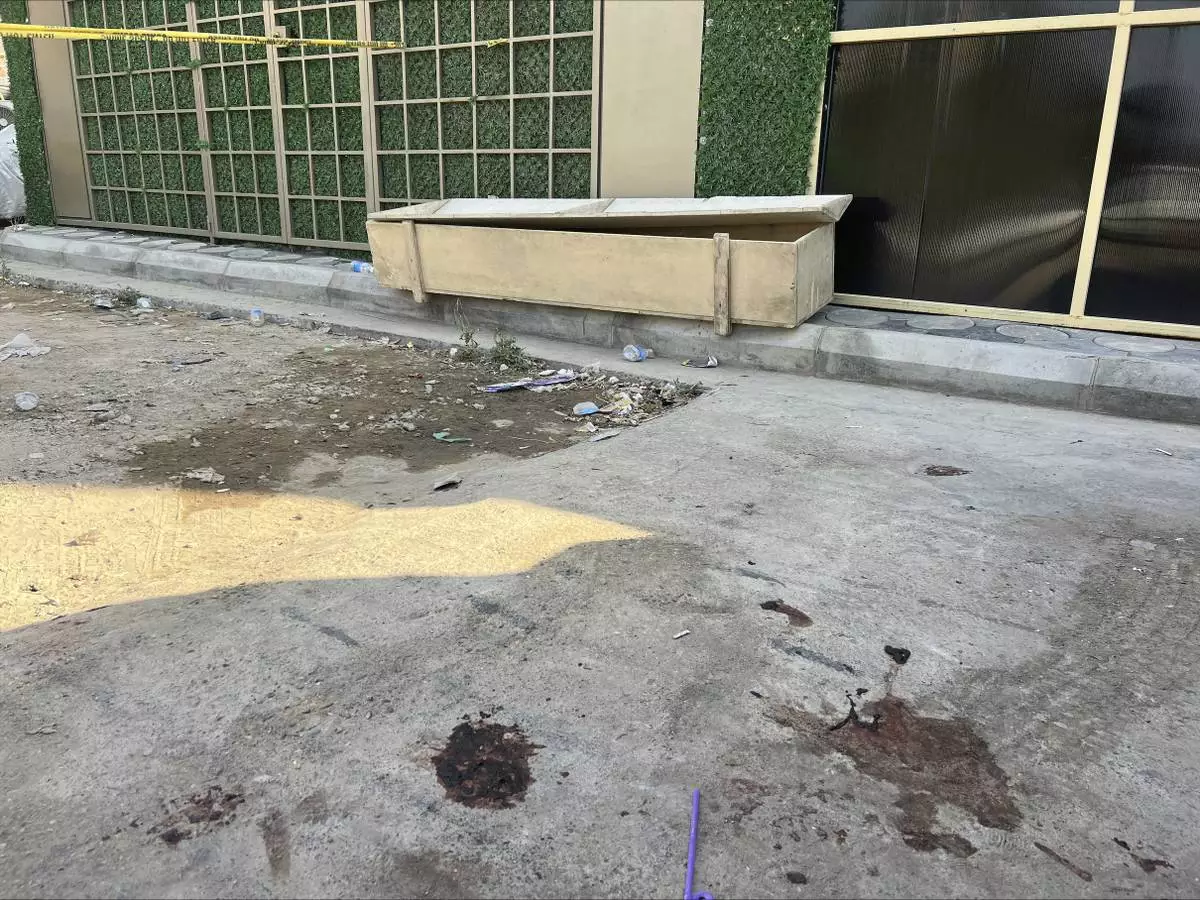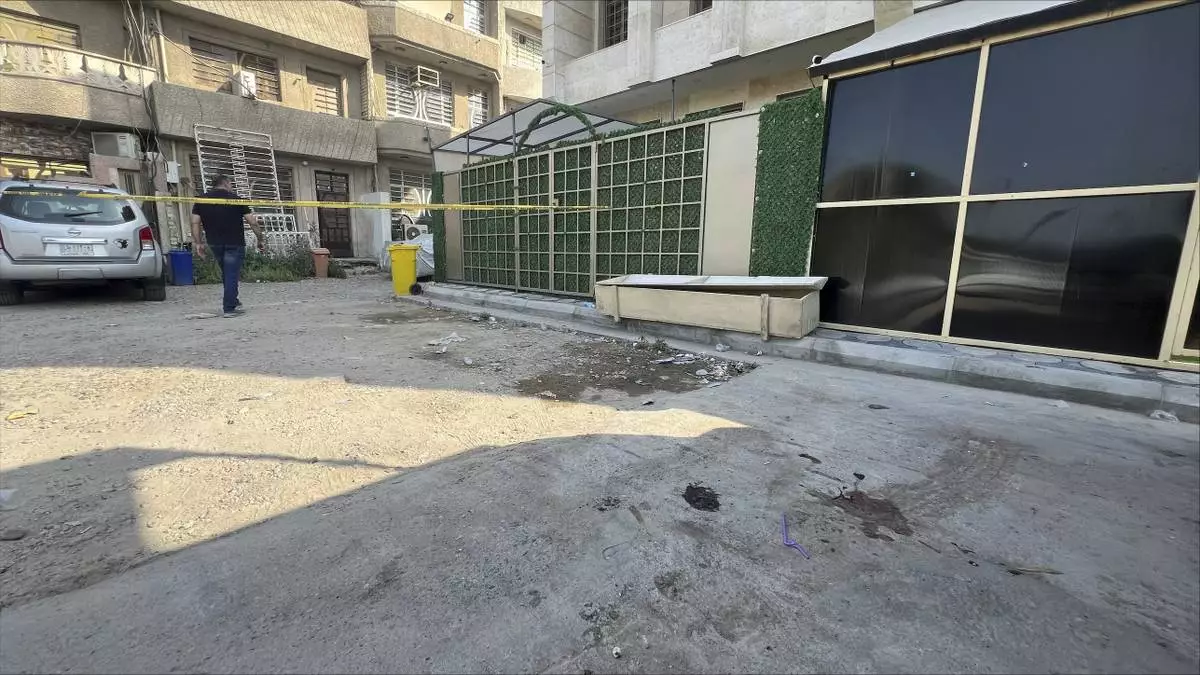BAGHDAD (AP) — Iraqi authorities on Saturday were investigating the killing of a well-known social media influencer, who was shot by an armed motorcyclist in front of her home in central Baghdad.
Ghufran Mahdi Sawadi, known as “Um Fahad," was popular on the social media sites TikTok and Instagram, where she posted videos of herself dancing to music and was followed by tens of thousands of users.
An Iraqi security official, who spoke on the condition of anonymity because he wasn't authorized to speak to the media, said that the assailant opened fire as Sawadi parked her Cadillac in front of her house on Friday, killing her, then took her phone and fled the scene.
The killing took place in Zayoona, the same neighborhood where a prominent Iraqi researcher and security expert Hisham al-Hashimi was gunned down in 2020. Before the U.S. invasion of 2003, the neighborhood was home to military leaders and considered a prestigious area in Baghdad. In recent years, many militia leaders have taken up residence there.
Sawadi isn't the first prominent social media figure to be gunned down in central Baghdad. Last year, Noor Alsaffar or “Noor BM,” a transgender person with a large social media following, was also fatally shot in the city.
A neighbor of Sawadi who identified himself only by his nickname, Abu Adam or “father of Adam,” said he came out to the street after hearing two shots fired and saw “the car’s door open and she was lying on the steering wheel.”
“The woman who was with her (in the car) escaped, and security forces came and sealed off the entire area, and they took the victim’s body and towed her car,” he said.
In Iraq, the role of social media influencers has broadened from promoting beauty products and clothing to government projects and programs. Official government invitations classify these influencers as key business figures at sports, security and cultural gatherings.
Videos featuring a prominent influencer during the 93rd anniversary on Thursday of the Iraqi air force’s founding sparked a backlash, with many criticizing the Ministry of Defense for allowing them to record and publish videos from sensitive military sites. The ministry defended itself, saying that in the era of social media, like defense ministries worldwide, it uses influencers alongside traditional media to communicate with the public.
Last year, an Iraqi court sentenced Sawadi to six months in prison for posting several films and videos containing obscene statements and indecent public behavior on social media as part of a recent push by the Iraqi government to police morals.
Separately on Saturday, the Iraqi parliament passed an amendment to the country’s prostitution law — widely criticized by human rights groups — that would punish same-sex relations with a prison term ranging from 10 to 15 years. A previous version of the law would have imposed the death penalty.
The law also bans any organization that promotes “sexual deviancy,” imposing a sentence of at least seven years and a fine of no less than 10 million dinars (about $7,600).
The acting parliamentary speaker, Mohsen Al-Mandalawi, said in a statement that the vote was “a necessary step to protect the value structure of society” and to “protect our children from calls for moral depravity and homosexuality.”
Rasha Younes, a senior researcher with the LGBT Rights Program at Human Rights Watch, said the law's passage “rubber-stamps Iraq’s appalling record of rights violations against LGBT people and is a serious blow to fundamental human rights, including the rights to freedom of expression and association, privacy, equality, and nondiscrimination.”
A report released by the organization in 2022 accused armed groups in Iraq of abducting, raping, torturing, and killing lesbian, gay, bisexual, and transgender people with impunity and the Iraqi government of failing to hold perpetrators accountable.

Blood covers the ground at the scene of a shooting on Saturday, April 27, 2024 in Baghdad, Iraq. Iraqi authorities are investigating the killing of Ghufran Mahdi Sawadi, a well-known social media influencer, who was shot by an armed motorcyclist in front of her home in central Baghdad. (AP Photo/Ali Jabar)

Blood covers the ground at the scene of a shooting on Saturday, April 27, 2024 in Baghdad, Iraq. Iraqi authorities are investigating the killing of Ghufran Mahdi Sawadi, a well-known social media influencer, who was shot by an armed motorcyclist in front of her home in central Baghdad. (AP Photo/Ali Jabar)
SACRAMENTO, Calif. (AP) — California could soon deploy generative artificial intelligence tools to help reduce traffic jams, make roads safer and provide tax guidance, among other things, under new agreements announced Thursday as part of Gov. Gavin Newsom’s efforts to harness the power of new technologies for public services.
The state is partnering with five companies to create generative AI tools using technologies developed by tech giants such as Microsoft-backed OpenAI and Google-backed Anthropic that would ultimately help the state provide better services to the public, administration officials said.
“It is a very good sign that a lot of these companies are putting their focus on using GenAI for governmental service delivery," said Amy Tong, secretary of government operations for California.
The companies will now start a six-month internal trial where the tools are tested and evaluated by state workers. The companies will be paid $1 for their proposals. The state, which faces a significant budget deficit, can then reassess whether any tools could be fully implemented under new contracts. All the tools are considered low risk, meaning they don’t interact with confidential data or personal information, an administration spokesperson said.
Newsom, a Democrat, touts California as a global hub for AI technology, noting 35 of the world's top 50 AI companies are located in the state. He signed an executive order last year requiring the state to start exploring responsible ways to incorporate generative AI by this summer, with a goal of positioning California as an AI leader. In January, the state started asking technology companies to come up with generative AI tools for public services. Last month, California was among one of the first states to roll out guidelines on when and how state agencies could buy such tools.
Generative AI, a branch of AI that can create new content such as text, audio and photos, has significant potential to help government agencies become more efficient but there's also an urgent need for safeguards and oversight to limit risks, state officials and experts said. In New York City, an AI-powered chatbot created by the city to help small businesses was found to dole out false guidance and advise companies to violate the law. The rapidly growing technology has also raised concerns about job loss, misinformation, privacy and automation bias.
While state governments are struggling to regulate AI in the private sectors, many are exploring how public agencies can leverage the powerful technology for public good. California's approach, which also requires companies to disclose what large language models they use to develop AI tools, is meant to build public trust, officials said.
The California Department of Transportation is looking for tools that would analyze traffic data and come up with solutions to reduce highway traffic and make roads safer. The state’s Department of Tax and Fee Administration, which administers more than 40 programs, wants an AI tool to help its call center cut wait times and call length. The state is also seeking technologies to provide non-English speakers information about health and social services benefits in their language and to streamline the inspection process for health care facilities.
The tool is designed to assist state workers, not replace them, said Nick Maduros, director of the Department of Tax and Fee Administration.
Call center workers there took more than 660,000 calls last year. The state envisions the AI technology listening along to those calls and pulling up specific tax code information associated with the problem the caller is describing. The worker could decide whether to use the information. Currently, call center workers have to simultaneously listen to the call and manually look up the code, Maduros said.
“If it turns out it doesn't serve the public better, then we're out $1,” Maduros said. “And I think that's a pretty good deal for the citizens of California.”
Tong wouldn't say when a successfully vetted tool would be deployed, but added that the state is moving as fast as it can.
“The whole essence of using GenAI is it doesn't take years,” Tong said. “GenAI doesn't wait for you.”

FILE -California Gov. Gavin Newsom speaks in Larkspur, Calif., Tuesday, April 16, 2024. California could soon deploy generative artificial intelligence tools to help reduce traffic jams, make roads safer and provide tax guidance, among other things, under new agreements announced Thursday, May 9, 2024, as part of Gov. Gavin Newsom's efforts to harness the power of new technologies for public services. (AP Photo/Jeff Chiu, File)












